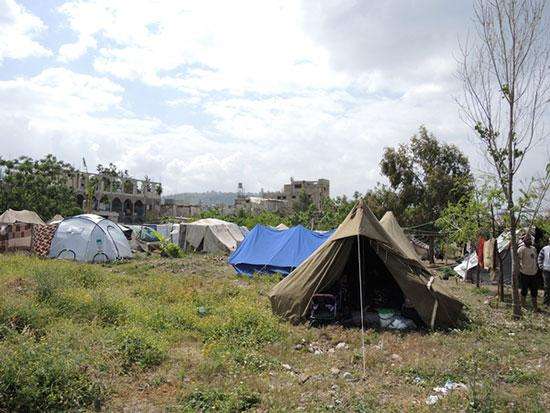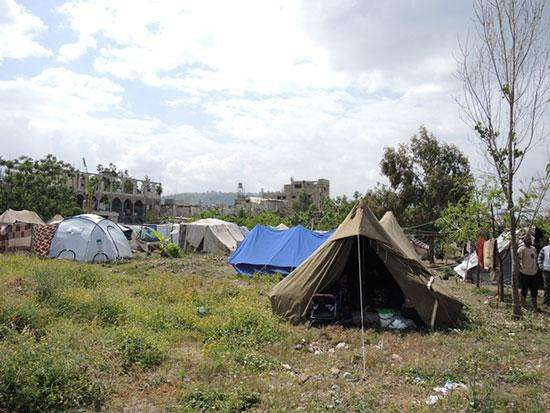“It’s very difficult,” he says. “Seven of my relatives were killed by the bombings and shootings in Syria. We saw their mutilated bodies. I buried them myself and buried my neighbors too. My son disappeared. One month later, my brother disappeared. I’m sure they got killed and this is causing me a lot of sadness.”
Already Overcrowded, More Arriving Each Day
Around 60 other families have gathered in and around what used to be a social and cultural center in the Ain el-Helweh camp. More than half of them share 19 overcrowded tents, while the rest are crammed in small rooms—Mahmood and his family are separated from another family by only a plank of wood. Other Palestinian refugees who fled the war in Syria are living in similar conditions elsewhere in the camp.
Created in 1948 to accommodate 10,000 people, Ain el-Helweh is now the largest Palestinian refugee camp in Lebanon, hosting an estimated 80,000 people. In the past six months, an estimated 2,400 Palestinian and Syrian families fleeing Syria have taken refuge in this already overcrowded camp, living with host families, renting accommodations, or gathering in collective shelters or tents in the camp. As newcomers and established residents alike try to make due, Doctors Without Borders/Médecins Sans Frontières (MSF) has seen a growing need for mental health services among the population.
Depression, Anxiety Commonplace
A young man named Rabeeh shares a narrow living space with his wife on the other side of the wooden plank from Mahmood’s family. Rabeeh’s wife was pregnant not long ago but lost her baby before it was born. Additionally, says Nissreen Moghamis, an MSF social worker, “Rabeeh keeps thinking about his brother who went missing. He’s very worried and depressed, because he doesn’t know what happened to him. He’s crying most of the time and has constant nightmares. He doesn’t know how to deal with this situation.”
MSF teams hear similar stories "every day," says Moghamis. Depression, anxiety, and post-traumatic stress disorder are the most common diagnoses for patients coming from Syria. “There’s a high level of trauma,” says Manal Kassem, a psychotherapist working in one of MSF’s clinics. “Many [people] have witnessed the killings of relatives and friends, the burning of their houses, some of them have been tortured. A lot of people suffer from panic attacks, memory gaps, nightmares, etc. On top of this, they face very difficult living conditions and struggle to find basic life necessities.”
Numerous conflicts arise between family members due to the small spaces they have to share. Domestic violence has increased as well. At the same time, the influx of new refugees puts pressure on long-time residents. “They’re sharing houses and borrowing money to support five, six families, because they cannot say no,” says Kassem. “They follow the tradition of hospitality although they cannot afford it anymore. But they worry about their future. Many of them only eat once a day now.”
MSF’s Services
MSF has been running a community-based mental health program in Saida since April 2011, working in five health facilities, primarily targeting Ain el-Helweh’s Palestinian population and other vulnerable communities both inside and outside the camp.
“Some people tell me, give me a shelter and my mental health will be fine,” says Mohamed Zeidan, an MSF social worker who conducts daily home visits to provide social assistance, psychological care, and medical and non-medical referrals for those who need them. Kassem says the “psychological first aid” is the priority, however, because trauma-related conditions can worsen over time if left unattended.
MSF’s community health workers and social workers spread the word about MSF's mental health care services and urge those receiving care to attend their consultations and adhere to treatment. MSF also provides free treatment to refugees who were on medication before and had to stop because of war or financial difficulties.
Since the beginning of the year, patients from Syria have come to represent 43 percent of MSF’s new patients in the area. “Their numbers keep increasing and their needs in mental health care are very high,” says Rola Charlieh, head of MSF’s medical activities in Saida.





